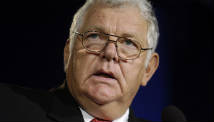National Rifle Association Executive Vice President Wayne LaPierre calls on Congress to pass a law putting armed police officers in every school in America.
STORY HIGHLIGHTS
- David Gergen: After election, there were hopes partisan tension would fade
- He says this week we've seen a complete breakdown on the fiscal cliff
- The NRA doubled down on its anti-gun-control rhetoric despite Newtown, he says
- Gergen: We're seeing the character assassination of a hero, Chuck Hagel
Editor's note: David Gergen is a senior political analyst for CNN and has been an adviser to four presidents. A graduate of Harvard Law School, he is a professor of public service and director of the Center for Public Leadership at Harvard University's Kennedy School of Government. Follow him on Twitter.
(CNN) -- What in the world is gripping Washington? Everywhere one turns -- from finances to guns to nominations -- there is madness in the air.
With time rapidly running out, efforts have collapsed to reach a major agreement on federal spending and taxes before year's end, and both Congress and President are leaving town for the holidays. At best, they will return next week and construct a small bridge over the "fiscal cliff"; at worst, they won't. But who knows?

David Gergen
And that's a big part of the problem -- no one can be confident that our national leaders are still capable of governing responsibly. And in the process, they are putting both our economy and our international reputation at risk.
Fresh poison
President Barack Obama had rightly hoped that the elections would clear the air; they haven't. If anything, the recent squabbling over the federal budget has injected fresh poison into relationships and dimmed prospects for other bipartisan agreements in the next few years, starting with hopes for a "grand bargain"in 2013.
John Boehner and Eric Cantor, the House GOP leaders
The President insists he remains an optimist, but if he and Republicans can't agree on how to bring the nation's finances under control -- something fundamental to the welfare of the country -- why should we have faith they will succeed on other important issues like energy, education, immigration and gun safety?
As the blame game heats up, Republicans are sure to pay the biggest price with the public. It was bad enough that they lost the message fight, letting themselves be painted as protectors of the wealthy. But it was inexcusable when they revolted against House Speaker John Boehner in his search for a way forward: that only reinforced a narrative that the Grand Old Party has fallen hostage to its right wing -- a narrative that already exacted a huge price in the fall elections.
Most voters -- I am among them -- believe the country needs a center-right party but will not support an extremist party.
President Obama is certainly not blameless in these financial talks. Early on, he overplayed his hand, alienating rank-and-file Republicans. Like Boehner, he has been more accommodating recently, offering concessions on taxes and entitlement spending that narrowed the negotiating gap between the parties, even as his leftward allies fretted.
Still, Boehner has a point in arguing that what Obama now has on the table comes nowhere close to what the he was advocating in the election season: a ratio of 2.5 dollars in spending cuts to 1.0 dollars in tax increases.
The buck stops on the President's desk, so that ordinarily one would expect him to take the lead in these final days before January 1. For reasons that are still unclear, he instead chose in his press statement late Friday to toss responsibility for negotiations next week into the laps of Congressional leaders.
Perhaps he has reached a quiet understanding with Boehner and Senate Majority Leader Harry Reid that the two of them can work out a stripped-down agreement. Let's hope so. But as we enter the holidays, it appears to be a mess. And time is quickly running out.
The NRA in denial
As if Friday weren't gloomy enough, the National Rifle Association weighed in with its long-awaited response to the horrors of Newtown, Connecticut. There had been hints that the NRA would offer a more conciliatory stance. Just the opposite: they doubled down.
Incredibly, Wayne LaPierre, executive vice president of the NRA, called for putting armed police officers in every school. Isn't that what parents of every six-year old have been longing for: to have their child studying and playing under the watchful eye of an armed guard? Has LaPierre visited an elementary school classroom in recent years? If so, he would know his idea would be repulsive in most schools.
Just as strikingly, the NRA response refused to acknowledge and address the beliefs of a majority of Americans in recent polls that the U.S. needs tougher laws in favor of gun safety. Americans aren't saying no one should have guns or that the 2nd Amendment should be gutted but they are demanding a national conversation to see what can be sensibly done. It is hard to have a conversation when one side won't talk.
Character assassination
Meanwhile, in a less noticed but important saga in Washington, we are once again watching the character assassination of a public servant of honor and distinction.
Chuck Hagel served America with valor as a sergeant in the Vietnam war, earning two Purple Hearts. He was a popular Republican senator from Nebraska who paid close attention to international affairs and is now co-chair of the President's Foreign Intelligence Advisory Board, serving with another former Senator, David Boren.
Ever since Hagel's name arose as a top candidate to become the next Secretary of Defense, he has been pilloried for statements and stands he has taken in the past. Is it legitimate to question his positions on Israel, Iran, and on gays? Absolutely. But what is grossly unfair is to misstate them, saying that he is against sanctions on Iran when in fact he has argued in favor of international sanctions, not unilateral sanctions (which don't work). As someone who strongly favors Israel, I am also deeply troubled by the way he has been misrepresented as virtually anti-Semitic.
Nor is this a fair fight. Hagel is in no-man's land because his name is prominently mentioned but he hasn't been formally nominated, so the White House isn't rushing to the barricades to support him.
The signals from 1600 Pennsylvania Avenue were that the Secretary of Defense nominee would be announced in a package with the Secretary of State. The President has now gone ahead with John Kerry but the absence of a Defense nominee has now left Hagel dangling in the breeze, a piñata.
The White House should now move early next week -- by announcement or by leak -- to settle this by making a decision. Whether or not the President nominates Hagel, he should put a stop to the defamation by recognizing Hagel as a patriot with an independent mind and a long record of honor. If selected as Secretary, Hagel would be a very fine member of the national security team.
One had hoped that the shootings at Sandy Hook would draw us together. Sadly, they haven't. Now, perhaps the blessings of the holidays and a brief moment to take a breath will lift our sights. Surely, this madness should not continue into the New Year.
Follow @CNNOpinion on Twitter
Join us at Facebook/CNNOpinion
The opinions expressed in this commentary are solely those of David Gergen.













